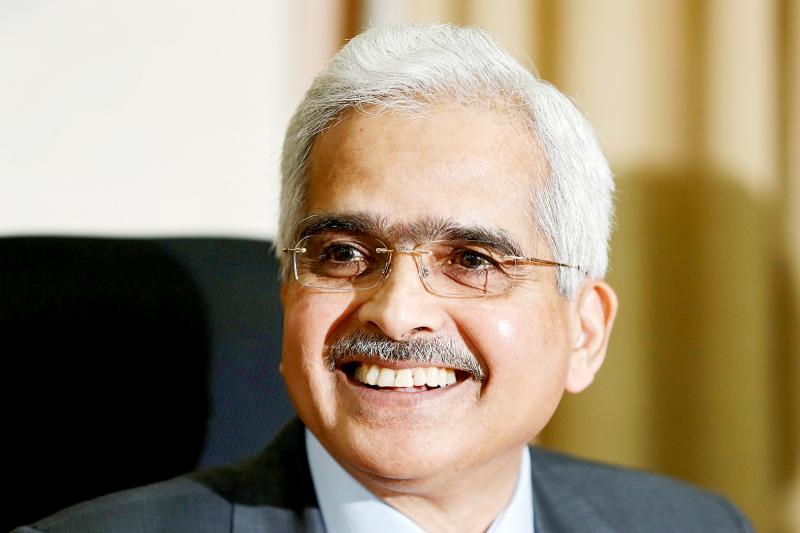The head of the Indian central bank yesterday said he is concerned that cryptocurrencies might affect financial stability in Asia’s third-largest economy, a view that could shape regulations on the asset that is breaking price records around the world.
The monetary authority has conveyed these “major concerns” to the Indian government, Reserve Bank of India Governor Shaktikanta Das said in an interview with CNBC TV-18.
Indian Prime Minister Narendra Modi’s administration is proposing to prohibit all private cryptocurrencies in the country and create a framework for an official digital currency.

Photo: Francis Mascarenhas, Reuters
While Das did not elaborate, the bank has expressed concerns on digital currencies related to issues ranging from money laundering to funding terrorists.
The central bank had banned banks and other regulated entities from supporting cryptocurrency transactions in 2018 after digital currencies were used for fraud following Modi’s landmark demonetization program that replaced India’s cash with new bills.
The Indian Supreme Court cut the curbs last year in response to a petition by cryptocurrency exchanges.
The central bank is “very much in the game” in getting ready to launch its own digital currency, Das said, joining other central banks, including China’s electronic yuan.
While there was no set date for roll out, the project is “receiving our full attention,” while the Reserve Bank of India is working on the technology and procedural aspects, and is tying up several loose ends, Das added.

To many, Tatu City on the outskirts of Nairobi looks like a success. The first city entirely built by a private company to be operational in east Africa, with about 25,000 people living and working there, it accounts for about two-thirds of all foreign investment in Kenya. Its low-tax status has attracted more than 100 businesses including Heineken, coffee brand Dormans, and the biggest call-center and cold-chain transport firms in the region. However, to some local politicians, Tatu City has looked more like a target for extortion. A parade of governors have demanded land worth millions of dollars in exchange

An Indonesian animated movie is smashing regional box office records and could be set for wider success as it prepares to open beyond the Southeast Asian archipelago’s silver screens. Jumbo — a film based on the adventures of main character, Don, a large orphaned Indonesian boy facing bullying at school — last month became the highest-grossing Southeast Asian animated film, raking in more than US$8 million. Released at the end of March to coincide with the Eid holidays after the Islamic fasting month of Ramadan, the movie has hit 8 million ticket sales, the third-highest in Indonesian cinema history, Film

Taiwan Semiconductor Manufacturing Co’s (TSMC, 台積電) revenue jumped 48 percent last month, underscoring how electronics firms scrambled to acquire essential components before global tariffs took effect. The main chipmaker for Apple Inc and Nvidia Corp reported monthly sales of NT$349.6 billion (US$11.6 billion). That compares with the average analysts’ estimate for a 38 percent rise in second-quarter revenue. US President Donald Trump’s trade war is prompting economists to retool GDP forecasts worldwide, casting doubt over the outlook for everything from iPhone demand to computing and datacenter construction. However, TSMC — a barometer for global tech spending given its central role in the

Alchip Technologies Ltd (世芯), an application-specific integrated circuit (ASIC) designer specializing in server chips, expects revenue to decline this year due to sagging demand for 5-nanometer artificial intelligence (AI) chips from a North America-based major customer, a company executive said yesterday. That would be the first contraction in revenue for Alchip as it has been enjoying strong revenue growth over the past few years, benefiting from cloud-service providers’ moves to reduce dependence on Nvidia Corp’s expensive AI chips by building their own AI accelerator by outsourcing chip design. The 5-nanometer chip was supposed to be a new growth engine as the lifecycle